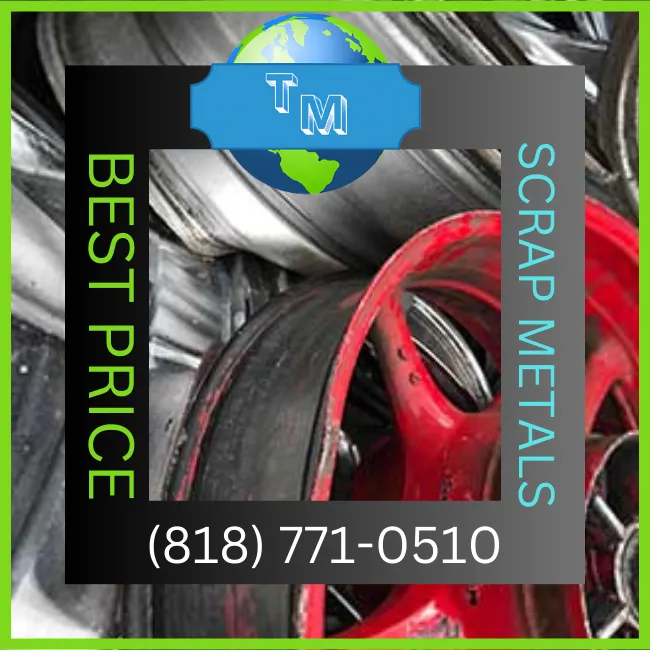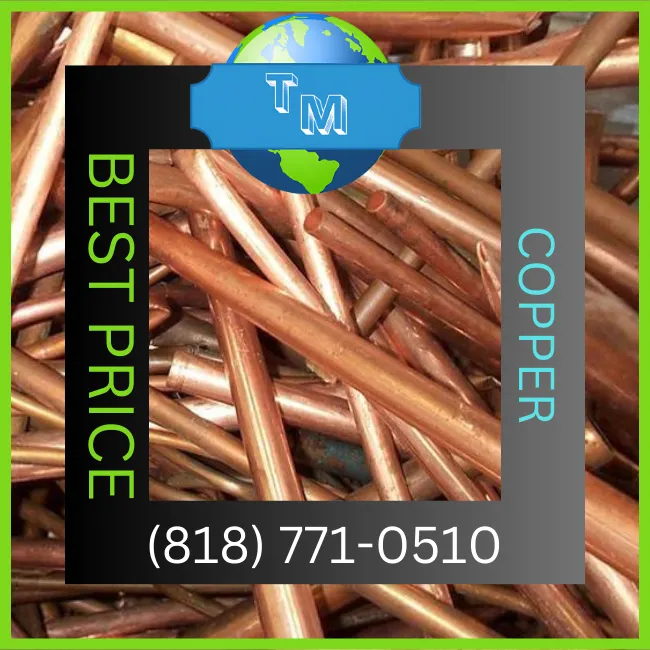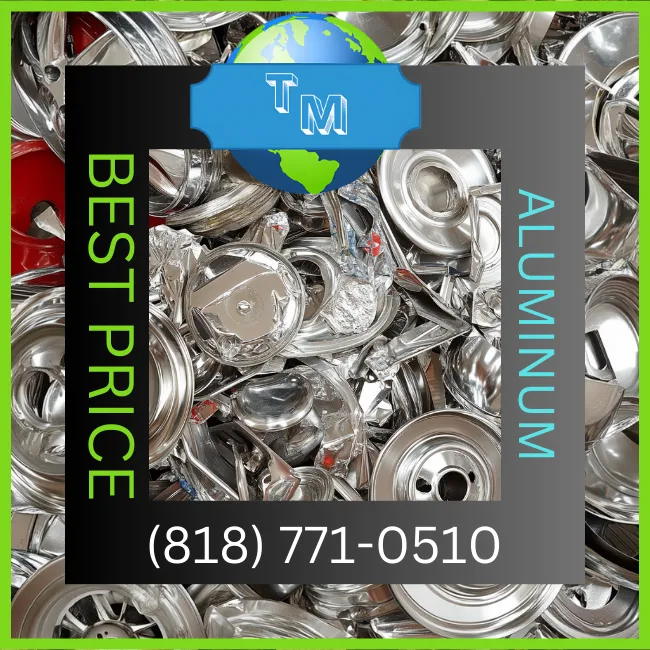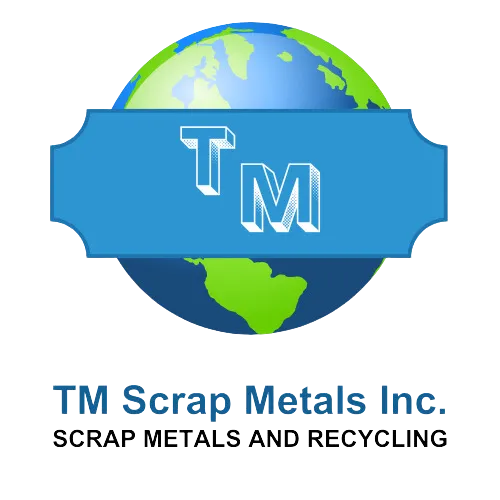Sponsored





Insulated Copper Wire Recycling in Burbank, CA
Recycle Your Scrap Wire For Cash—fast, Fair & Local Service
Looking to recycle insulated copper wire in Burbank? Local recycling centers offer competitive payouts for all types of insulated wire, including THHN, Romex, and communication cables. Whether you're an electrician, contractor, or homeowner, Burbank recyclers provide accurate grading, quick turnaround, and environmentally responsible processing. Connect with trusted insulated copper wire recycling centers in Burbank and get a quote today.
Insulated Copper Wire Recycling in Burbank – Why Hire a Professional Insulated Copper Wire Recycling Service
Get Maximum Returns from Your Scrap with Professional Insulated Copper Wire Recycling in Burbank
What Is Insulated Copper Wire and Why Recycle It?
Insulated copper wire (ICW) is everywhere—from household electrical systems and commercial installations to manufacturing equipment and tech devices. It consists of valuable copper conductors encased in plastic or rubber insulation, making it more complex to recycle than bare copper wire.
In Burbank, where commercial growth and residential remodeling are common, large amounts of ICW are generated as waste. Insulated copper wire recycling in Burbank plays a vital role in keeping copper in circulation and reducing environmental waste. But to get the best value, you need professionals who can properly grade, strip, and process this type of wire.
Why Hire a Professional Insulated Copper Wire Recycling Service?
While it might be tempting to throw all wires into a bin and hope for the best, the difference in copper content and insulation types can drastically affect your payout. That’s why hiring a professional insulated copper wire recycling service in Burbank makes a big difference.
Here’s what the pros offer:
- Accurate Wire Grading: Distinguish between high-grade, mid-grade, and low-grade ICW
- Stripping Services: Remove insulation to recover clean copper for top-dollar pricing
- Real-Time Market Rates: Get paid based on current copper values
- Certified Scales: Ensure fair weight-based payments
- Bulk Collection: Great for electricians, contractors, and developers
- Compliance: Fully documented and regulated under California’s scrap laws
These services help you avoid underpayment due to misidentified or mixed loads and reduce the labor needed to prepare your wire for sale.
Types of Insulated Copper Wire Commonly Recycled in Burbank
Not all insulated wire is created equal. In Burbank, recyclers typically handle:
- THHN/THWN: High-grade building wire with thin insulation
- Romex: Heavily insulated wire used in residential settings
- Data & Communication Wire: CAT5, CAT6, and coaxial cable
- Appliance Wire: Used in household devices and HVAC systems
- Extension Cords: Heavier insulation but still copper-rich inside
Professionals will sort and strip this wire to recover as much clean copper as possible. In some cases, removing insulation can double or triple the per-pound price you receive.
Economic and Environmental Benefits of Recycling ICW
Recycling insulated copper wire in Burbank has both financial and environmental payoffs. Copper is one of the most in-demand metals worldwide due to its use in electrical systems and green energy infrastructure. By recycling ICW, you help keep this limited resource in circulation.
Environmentally, recycling copper saves up to 85% of the energy required to mine and process new copper. It also keeps insulation waste—often made from plastics and rubber—out of landfills.
Economically, copper commands top dollar in the scrap industry. With proper sorting and stripping, ICW becomes a major income generator for contractors and electricians.
Choosing the Right Insulated Copper Wire Recycling Partner in Burbank
Not every scrap yard is equipped to handle ICW properly. When searching for a reliable insulated copper wire recycling service in Burbank, consider:
- Specialization: Choose recyclers who understand ICW grading and copper recovery
- Transparent Pricing: Itemized payments by grade and weight
- Pickup Services: Ideal for high-volume operations or job site cleanouts
- Customer Reviews: Strong testimonials reflect service quality and pricing honesty
- State Certification: Compliance with California’s scrap handling and reporting laws
Partnering with professionals ensures your wire is sorted efficiently, processed for maximum return, and handled legally from start to finish.
In conclusion, hiring a professional insulated copper wire recycling service in Burbank is the smart choice for those who want fair pay, reduced effort, and a positive environmental impact.
TM Scrap Metals, Inc
Recycling Center

Google: 4.8 stars
Ferrous Metals Recycling, Non-Ferrous Metals Recycling
(818) 771-0510
11092 Tuxford St, Sun Valley, CA 91352
Website: www.tmscrapmetals.com




West Side Metal Recycling
Address: 6449 San Fernando Rd, Glendale, CA 91201
Phone: (818) 243-6965
Services: Recycling center, Liquidator
Website: wsrecycling.com
Google Rating: 3.7 (29 reviews)
Hours: Monday - Friday: 8 AM - 4:30 PM | Saturday: 8 AM - 3 PM | Sunday: Closed
Allan Company Recycling Center
Address: 540 W Chevy Chase Dr, Glendale, CA 91204
Phone: (818) 552-2870
Services: Recycling center
Website: allancompany.com
Google Rating: 4.5 (95 reviews)
Hours: Monday - Friday: 7:30 AM - 4:45 PM | Saturday: 8 AM - 3:30 PM | Sunday: Closed
Atlas Iron & Metal Company, Inc
Address: 10019 S Alameda St, Los Angeles, CA 90002
Phone: (323) 566-5184
Services: Recycling center, Aluminum supplier, Metal supplier, Steel distributor
Website: atlasironandmetal.com
Google Rating: 4.4 (101 reviews)
Hours: Monday - Friday: 7 AM - 3:30 PM | Saturday: 7 AM - 11:30 AM | Sunday: Closed
Morton Scrap Metal
Address: 2020 Sacramento St, Los Angeles, CA 90021
Phone: (213) 896-0393
Services: Junkyard
Website: mortonscrapmetal.com
Google Rating: 3.3 (7 reviews)
Hours: Monday, Tuesday, Friday: 9 AM - 5 PM | Saturday - Sunday: 9 AM - 5 PM | Wednesday - Thursday: Closed
Insulated Copper Wire Recycling Burbank
Get paid fast for all insulated copper wire types.
Stop by Burbank’s top center for insulated copper wire recycling today!
People Also Ask
Insulated copper wire recycling involves recovering copper from electrical wires that are coated with plastic or rubber insulation. These wires are commonly found in appliances, electronics, vehicles, and buildings. The recycling process separates the insulation from the copper core, allowing both materials to be processed and reused. This helps conserve natural resources and reduces the amount of electronic and construction waste in landfills.
Common types include **#1 Insulated Wire** (thick copper wire with minimal insulation), **#2 Insulated Wire** (lower-grade with thinner copper or more insulation), **THHN wire**, **Romex cable**, **extension cords**, and **electronic cables**. Each type has different copper content and insulation levels, which affect scrap value. Most recycling centers accept all types, but sorting by category can improve payout.
Stripping wire can increase its value by exposing the clean copper underneath, especially for thicker wire like #1 or Romex. However, for smaller or lower-grade wires, the time and labor involved may outweigh the added value. Some scrap yards use granulators to mechanically separate copper from insulation, so it's often acceptable to recycle wires unstripped—though clean, stripped copper will always bring higher prices.
At recycling facilities, wires are sorted by type and copper content. They may be mechanically shredded using a wire granulator, which separates the copper from the insulation. The copper is then melted down and formed into new raw materials, while insulation is either recycled or disposed of safely. This process ensures efficient recovery of valuable copper without manual stripping.
Several factors influence value: the thickness and purity of the copper core, the type and amount of insulation, and current copper market prices. Wire with a high copper-to-insulation ratio is more valuable. Clean, sorted wire with minimal contamination (such as plugs or steel connectors) typically earns better pricing. Thicker wire types are usually worth more per pound than thin or mixed wires.
Insulated copper wire is found in household wiring, appliance cords, extension cables, electronics, automotive wiring harnesses, HVAC units, and construction debris. Contractors, electricians, and homeowners often generate recyclable wire during installations, renovations, or demolition projects. Keeping these wires separate from other materials makes recycling easier and more profitable.
Yes. Recycling insulated copper wire reduces the demand for newly mined copper, lowers greenhouse gas emissions, and keeps metal-rich waste out of landfills. It also helps recover high-quality materials that can be reused in manufacturing. The process supports a circular economy by conserving energy and reducing electronic and construction waste across industries.
Living in Burbank, CA: A Green Lifestyle in the Media Capital
A Lifestyle Built Around Sustainability
Burbank, California, renowned as the "Media Capital of the World," offers more than just proximity to major studios like Warner Bros. and Disney. For residents seeking a green lifestyle, Burbank provides eco-friendly initiatives and resources that support sustainable living. From an extensive network of bike paths to community gardens, the city is designed to encourage eco-conscious habits.
The city’s commitment to sustainability is evident in its widespread adoption of renewable energy and waste reduction programs. Burbank’s Recycling Center is a standout facility where residents can responsibly dispose of a wide array of materials, including scrap metal, electronics, and plastics. Living in Burbank means embracing a culture that values environmental responsibility as much as creativity and innovation.
Neighborhoods that Embrace Green Living
Each neighborhood in Burbank has its own charm, and many are increasingly focused on sustainability. Magnolia Park, for instance, is known for its vintage shops, eco-conscious boutiques, and a weekly Farmer’s Market offering fresh, locally sourced produce. The Rancho District, with its equestrian properties and proximity to Griffith Park, allows residents to enjoy a close connection with nature.
Beyond these neighborhoods, city-wide efforts include energy-efficient housing developments and the adoption of green building practices. Homeowners and renters alike can take advantage of Burbank Water and Power's programs for solar energy adoption and water conservation.
Scrap Metal Recycling: A Green Initiative
Recycling scrap metal is an essential part of Burbank's strategy to reduce landfill waste and support sustainability. The Burbank Recycling Center accepts aluminum, copper, steel, and other metals, making it easy for residents to recycle responsibly. By participating in these programs, residents not only help conserve natural resources but also contribute to reducing greenhouse gas emissions.
Local businesses also play a role, with many offering services that repurpose scrap metal into new products. Whether you're decluttering your home or renovating, these services provide an excellent way to ensure materials are reused rather than wasted.
For more information on sustainable living in Burbank, visit the city’s official website: City of Burbank Official Website.


